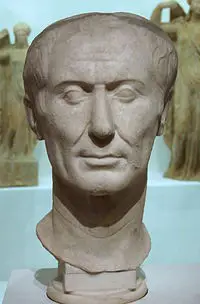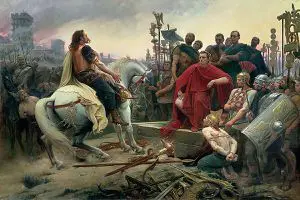How did Julius Caesar rise to power
Julius Caesar is one of the most famous leaders of the ancient world. His life and death are very well-known and still captivate people. He is not only one of the greatest generals who ever lived, but he who destroyed the Roman Republic. His ascent shifted the Roman Republic to the Roman Empire.
How did Caesar to rise to Emperor in the Roman Republic? There were three key reasons for the rise of Caesar: his role in the First Triumvirate, his conquest of Gaul and his victories during the Civil Wars. These were the key stages in Caesar’s career that allowed him to become the Emperor of Rome.
What happened in Caesar’s Early Life?
Caesar was born to a patrician Roman family that had once been very influential in the Republic. However, by the time of Caesar’s birth, their fortunes had been in decline for many years. Despite the decline of their family's reputation, his father did serve as a governor.[1] We know very little about Caesar's childhood. Through his aunt, he was related to Gaius Marius, the great general. This encouraged the young Julius to become associated with the Marius's popular (populares) party in Rome. These were aristocrats who had allied themselves with the poor.
By the time he was sixteen, he was the head of his family after the early death of his father. At this time, there was an ongoing bloody civil war between Marius and his Sulla, the head of the aristocratic or optimates party. After Sulla occupied Rome, Caesar was in danger because of his party. He went into hiding so he would not become another victim of the bloody proscriptions.[2] When Marius regained control of the city, Caesar married a leading politicians daughter and became the high priest of Jupiter.
However, when Sulla recaptured Rome, Caesar was stripped of his wealth and his office. He decided to join the army and served in Asia Minor and was decorated for bravery. Later after he was kidnapped by pirates he led a successful punitive expedition against them and was once again decorated for bravery. Caesar returned to Rome and became one of the leaders of the Marian party or popular party.[3] He became very prominent in Rome because of his lavish expenditures. He also forged a political alliance with Crassus, one of Rome's richest men. Caesar was later elected Pontifex Maximus (chief priest) of Rome and secured himself the governorship of a province in Spain.
In his new province he defeated some rebellious tribes and was accorded a Triumph and he was later nominated to the office of Consul, one of the most important roles in Rome (60 AD). At this stage, Caesar had a rather conventional career or the cursus honorum as it was known in Rome and one that was typical of a man of his class. However, a series of events which were brilliantly manipulated by Caesar and his military genius meant that he was to become the single most powerful Roman who lived, up to that point and the man who was to change Rome forever.[4]
What was the First Triumvirate of Caesar, Pompey, and Crassus?
By 59 BCE, Caesar was one of the most important political figures in Rome, mainly because of his connections to the old supporters of Marius. He also appears to have been genuinely popular among many ordinary Romans.[5] The political situation in Rome was chaotic and political violence was common, often orchestrated by gangs connected to leading public figures. In this situation, nothing could get done and there was political gridlock. The Senate wanted to control all aspects of political life as they had since the early days of the Republic. However, many aristocrats were frustrated by the conservatism of the Senators and believed that it was incapable of any meaningful decisions. Some of the leading figures in Rome at the time decided to come together and to enter an informal alliance in order to provide some stability and to secure their own political aims.[6]
Pompey, sometimes known as Pompey the Great was hailed by his contemporaries as a great general. While still a young man he had secured a series of victories which stabilized the Roman Republic and greatly expanded it. In a series of campaigns, he conquered a vast area around the Black Sea and the modern Middle East. He was revered in the city but not even he could persuade the Senate to grant his veterans lands. Crassus was very wealthy, and he wanted to translate this into political power. These two men entered into an alliance and they invited Caesar to join their informal arrangement. The richest man in Rome and its most famous soldier needed the young aristocrat, because of his links to the populares. They needed him to help them to obtain the votes that they needed to make sure that they could achieve their political goals and also guarantee at least some level of stability in the city.
The Triumvirate was not an arrangement that was based on shared views or aims but was designed to help the trio to further their ambitions. This arrangement benefitted Caesar immensely it allowed him to pay off some of his debts and to extend his influence in the city. Most importantly it allowed him to become Consul in 59AD and to initiate a series of reforms aimed at benefiting the ordinary Roman, which made him wildly popular in certain segments of society.[7] This allowed him to establish a network of supporters such as Clodius who were to protect and advance his interests. Moreover, his consulship allowed him the command of four legions and a province, in what is now southern France. This was to allow him to embark on his military career which was to be the key to his success.
Why did Caesar's conquer Gaul?
Some allies of the Romans in Gaul (modern France and Belgium) were defeated by Germanic tribes. This was used by Caesar as a pretext to intervene in Gaul and to begin its conquest. Caesar was a remarkable general.[8] He successfully defeated the Germanic tribes after he went north. The Gaul in the North and West were alarmed by the appearance of Romans and they began to form defensive alliances. These alliances were interpreted by Caesar as a threat to Rome even though this may not have been the case.
He ordered his legions to march to the far north of Gaul and he conquered much of the area. He also extended Roman influence into the south-west. Caesar had begun the conquest of Gaul without the sanction of the Senate and many regarded his campaign as an illegal war. At a conference in Lucca in 55 BCE, Caesar's consulship was extended. In addition to extending his consulship, Caesar was in charge of Gaul for another five years.

How did Caesar's invasion of Gaul and Britain allow him to seize power in Rome?
Eventually, Caesar did launch a raid on Britain. The Roman general was a great propagandist and he wrote reports on his campaigns that informed the public of his achievements. These are considered to be classics of Latin Literature. While Caesar was popular with many, he was hated by many Senators in Rome. He continued his campaigns and at the Battle of Alessia, he won a decisive victory that ended the conflict in Britain. After his victory, Caesar commanded a large army of seasoned troops who were loyal to him and many partisans in his native city.
He used to spoils of his Gaul and Britain to finance his supporters. Caesar had by now even eclipsed Pompey. However, the Senate wanted to strip him of his army and to prosecute him. When he responded to the Senate, he demanded that he be allowed to retain control of his legions. He sought to protect his interests from the Senate. When his request was refused by the Senate, Caesar crossed the Rubicon and occupied Rome. While it was an aggressive step to take, Caesar justified it as an act of self-defense against those who sought to harm him and his supporters.[9]
How did Caesar win the Roman Civil Wars of 49-44 BCE?
Caesar was by now the most powerful man in Rome, but he had many enemies. Pompey and his old foes the conservative Senators formed an alliance against Caesar. However, they had no legions at their disposal in Italy and they fled to the Balkans. Here they assembled a number of legions. The majority of the Roman Senate joined the Pompeiians as they came to be known and they controlled most of the Eastern provinces of the Roman Empire. Caesar knew he was vulnerable and that many in Italy hated him, despite his generally tolerant and benign rule. He knew that he had to defeat Pompey. Caesar took several legions to the Balkans and confronted the army of Pompey. This campaign was very difficult for Caesar and he was lucky to escape a decisive defeat. The conqueror of the Gaul’s maneuvered Pompey into a battle at Pharsalus in modern Greece. Caesar was out-numbered, and his opponent was a great general.
However, Caesar prevailed at Pharsalus and smashed the army of Pompey. This did not end the civil war. The victor returned to Rome and based on his success and the assertation that his enemies were a threat to the Republic he had himself declared Dictator, by the rump of the Senate who had not fled in 50 BCE. This was an office that gave him extraordinary powers, and he was effectively the sole ruler of the Roman Republic. He left Mark Anthony in control of Rome and Italy.[10] Pompey escaped, after Pharsalus and he and other senators vowed to continue the war. Caesar was even after Pharsalus still not master of the Roman World. Pompey was killed by a Roman renegade on the orders of the Pharaoh, but his adherents continued the fight.
The Pompeiians seized control of Africa and Spain. Caesar fought wars all over the Mediterranean and he emerged victoriously. He knew that all long as his enemies were in the field that he was not secure. Caesar finally defeated his enemies at the Battle of Munda in 45 BCE in Spain. After there was no real resistance to the rule of Caesar and he returned to Rome and he had himself appointed Dictator for life. He was by 44 AD the supreme leader in the Roman World and he was arguably the first Emperor in Roman history, although the majority of authorities hold that Augustus was the first Emperor.[11] This was based largely on his military prowess and his success on countless battlefields around Europe and the Middle East.
How did Caesar become a Dictator?
Caesar was a remarkable leader and the secret to his success was that he was able to seize opportunities in both the military and the political arena. This was a young man who came from an aristocratic family that had been long in decline but he was able to use his many talents to become the sole rule of Rome and the architect of the Roman Imperial System.
How did Caesar seize control of Rome? He was a member of the Populares Party and he was eventually able to secure leadership of this political group. Based on his support and influence he participated in the informal arrangement known as the First Triumvirate. This informal political alliance elevated him to become one of the most important politicians in Rome. This allowed him to become Consul and command a force of legions. Despite objections by the Senate, he used his legions to conquer Gaul and invade Britain. The support of the other parties in the Triumvirate allowed him to ignore the Senate. In the aftermath of the conquest of Gaul, he sent his troops across the Rubicon and occupied Rome. After he seized Rome, he triggered a Civil War that he won. While his rise was both remarkable and swift, it was ultimately short-lived because he was assassinated in 44 BCE.
Suggested Readings
- Goldsworthy, Adrian, Caesar: Life of a Colossus (Yale University Press, 2008)
- Freeman, Philip. Julius Caesar. Simon and Schuster, 2008)
- Grant, Michael. The Twelve Caesars (New York: Penguin Books, 1979)
- Osgood, Josiah. Caesar's Legacy: Civil War and the Emergence of the Roman Empire (Cambridge, Cambridge University Press, 2006)
- Holland, Tom. Rubicon: The Last Years of the Roman Republic (London, Anchor Press, 2003)
- Goodman, Rob. Rome's Last Citizen: The Life and Legacy of Cato: Mortal Enemy of Caesar (St. Martin's Griffen, 2014)
Related Articles
References
- Jump up ↑ Freeman, Philip. Julius Caesar. Simon and Schuster, 2008), p. 16
- Jump up ↑ Plutarch, Life of Caesar, vi
- Jump up ↑ Plutarch, vii
- Jump up ↑ Grant, Michael. The Twelve Caesars (New York: Penguin Books, 1979), p 15
- Jump up ↑ Plutarch, vix
- Jump up ↑ Holland, Tom. Rubicon: The Last Years of the Roman Republic (London, Anchor Press, 2003), p. 134
- Jump up ↑ Holland, p 156
- Jump up ↑ Grant, p. 98
- Jump up ↑ Plutarch, ix
- Jump up ↑ Suetonius, Life of Caesar, LXXIV
- Jump up ↑ Osgood, Josiah. Caesar's Legacy: Civil War and the Emergence of the Roman Empire (Cambridge, Cambridge University Press, 2006) p. 60

